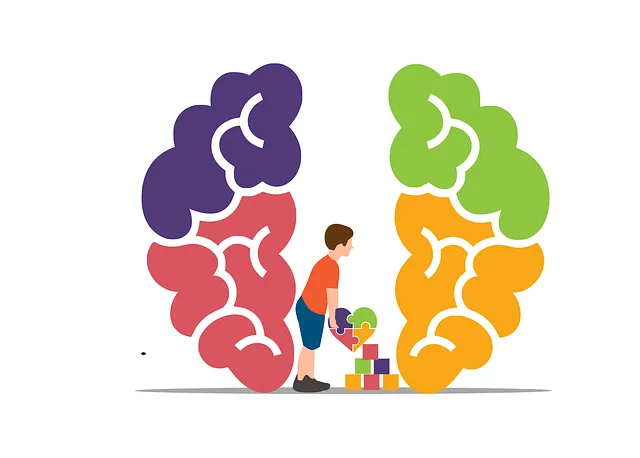Colorado Springs Kaiser Permanente psychiatry advocates positive thinking as a key practice for mental well-being, transforming negative thoughts and enhancing resilience. Their comprehensive services employ cognitive-behavioral therapy, mindfulness, and personalized coaching to improve mood regulation, self-esteem, and overall quality of life. Through structured routines, real-life scenarios, and techniques like guided imagery and gratitude journaling, they offer tailored positive thinking exercises for individual needs. This holistic approach, supported by research, reduces mental health stigma and revolutionizes care within the healthcare system.
“Unleash the power of positive thinking with an exploration of its foundational role in mental well-being. This article delves into the innovative practices of Colorado Springs Kaiser Permanente Psychiatry, a leading institution promoting proactive mindsets. Discover the art of designing and implementing effective positive thinking exercises, leveraging evidence-based principles and techniques. Learn from their success strategies and measure impact through efficacy evaluations. Embrace a transformative journey towards resilience and happiness, inspired by the expertise of Kaiser Permanente.”
- Understanding Positive Thinking: A Foundation for Mental Well-being
- The Role of Colorado Springs Kaiser Permanente Psychiatry in Promoting Positive Mindsets
- Designing Effective Positive Thinking Exercises: Principles and Techniques
- Implementing the Exercises: Strategies for Success in Clinical Settings
- Measuring Impact: Evaluating the Efficacy of Positive Thinking Programs at Kaiser Permanente
Understanding Positive Thinking: A Foundation for Mental Well-being

Positive thinking is a powerful tool that forms the bedrock of mental well-being, as emphasized by experts at Colorado Springs Kaiser Permanente psychiatry. It involves cultivating optimistic attitudes and reframing negative thoughts into more constructive ones. This simple yet profound practice can significantly enhance one’s ability to cope with life’s challenges and promote emotional well-being. By focusing on positive aspects, individuals can develop resilience, a key coping skill that enables them to navigate through difficult situations with grace and equanimity.
This mindset shift isn’t just about ignoring problems; rather, it’s an active process of recognizing the good in every situation, even amidst adversity. Emotional well-being promotion techniques like positive thinking have been shown to improve mood management, boost self-esteem, and foster a deeper sense of contentment and fulfillment. Through consistent practice, individuals can create a more balanced perspective, leading to improved mental health and overall quality of life.
The Role of Colorado Springs Kaiser Permanente Psychiatry in Promoting Positive Mindsets

Colorado Springs Kaiser Permanente Psychiatry plays a pivotal role in fostering positive mindsets within the community. Through their comprehensive services, they aim to enhance emotional regulation and promote mental wellness among individuals seeking support. The team of dedicated psychiatrists and coaches utilizes innovative strategies, often incorporating the latest research in cognitive-behavioral therapy and mindfulness practices, to assist patients in developing effective coping mechanisms.
By focusing on risk management planning for mental health professionals, Kaiser Permanente ensures a safe and supportive environment for both clients and practitioners. Their tailored Emotional Regulation programs cater to diverse needs, offering personalized coaching that empowers individuals to navigate life’s challenges with resilience. This holistic approach to mental wellness includes various initiatives, such as group therapy sessions, educational workshops, and accessible online resources, all designed to encourage positive thinking exercises and overall well-being.
Designing Effective Positive Thinking Exercises: Principles and Techniques

Designing Effective Positive Thinking Exercises involves a thoughtful blend of principles and techniques tailored to individual needs. At Colorado Springs Kaiser Permanente psychiatry, professionals emphasize structured yet flexible routines that foster emotional well-being. Key principles include incorporating real-life scenarios, encouraging mindfulness practices, and teaching cognitive reframing to challenge negative thought patterns. Techniques such as guided imagery, positive affirmations, and gratitude journaling are powerful tools for promoting anxiety relief and emotional regulation.
For optimal impact, exercises should be personalized, building upon an individual’s unique strengths and experiences. Incorporating elements of crisis intervention guidance can enhance resilience by equipping individuals with coping strategies to navigate challenging situations. Regular practice and tracking progress are vital, allowing for adjustments and ensuring the effectiveness of the positive thinking regimen.
Implementing the Exercises: Strategies for Success in Clinical Settings

Implementing positive thinking exercises in clinical settings requires a structured approach tailored to patient needs and preferences. At Colorado Springs Kaiser Permanente psychiatry, mental health professionals utilize a variety of techniques from Compassion Cultivation Practices to help patients cultivate resilience and reframe negative thoughts. These exercises often involve mindfulness meditation, gratitude journaling, and cognitive reframing strategies designed to enhance emotional well-being and Mood Management.
To ensure success, treatment plans should be individualized, incorporating elements that resonate with each patient’s unique journey. Regular feedback sessions allow healthcare providers to adjust the intensity and type of exercises based on progress. Additionally, integrating these practices into existing therapy models, such as cognitive behavioral therapy (CBT), can make them feel more accessible and less daunting, thereby fostering a supportive environment where Mental Illness Stigma Reduction Efforts can thrive.
Measuring Impact: Evaluating the Efficacy of Positive Thinking Programs at Kaiser Permanente

At Colorado Springs Kaiser Permanente, the implementation of positive thinking exercises has been met with keen interest and rigorous evaluation. The healthcare provider’s psychiatry department recognized the potential benefits of cultivating mental wellness through constructive thought patterns. As such, they embarked on a comprehensive initiative to integrate these practices into their patient care strategies.
Through a series of carefully designed studies, researchers at Kaiser Permanente scrutinized the efficacy of positive thinking programs. By employing robust evaluation methods, they delved into measurable outcomes related to patient improvement in mental wellness and communication strategies. The results have been promising, suggesting enhanced patient engagement and satisfaction, coupled with more effective coping mechanisms for stress management. This successful implementation underscores the growing importance of cultural competency training for healthcare providers, demonstrating how positive thinking exercises can be a game-changer in delivering holistic care.
The implementation of positive thinking exercises, as demonstrated by the successful initiatives at Colorado Springs Kaiser Permanente psychiatry, offers a powerful tool for enhancing mental well-being. By understanding the foundational principles and employing effective techniques, healthcare professionals can create engaging and impactful programs. These strategies, when implemented in clinical settings, not only promote optimistic mindsets but also lead to measurable improvements in patient outcomes. As evidenced by the evaluated programs at Kaiser Permanente, positive thinking exercises have the potential to revolutionize mental health care, fostering resilience and overall well-being among individuals.




